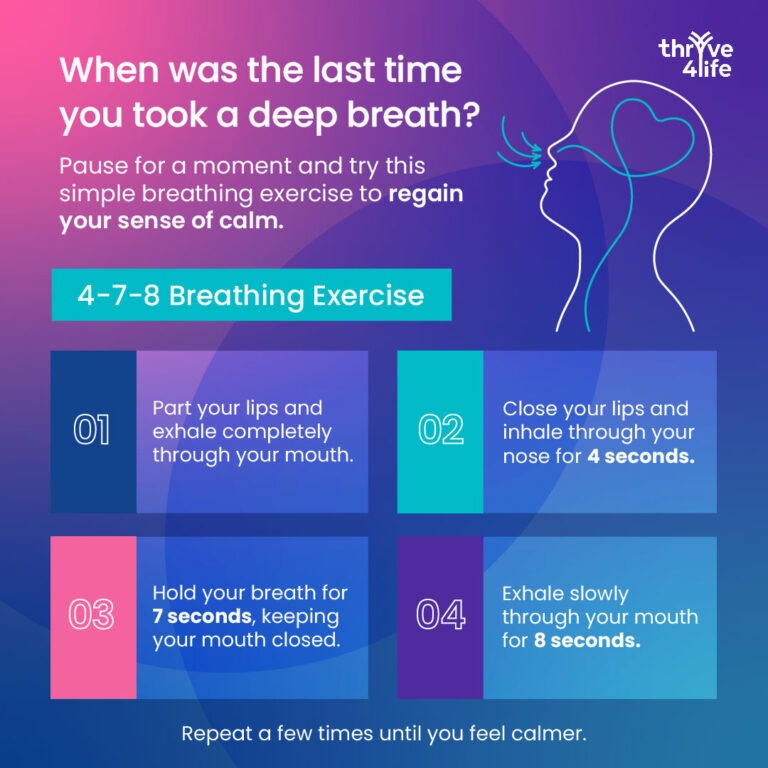We all experience stress at various points in our lives, perhaps due to relationship issues, family disputes, or health concerns. However, one of the biggest causes of stress in the UK is the workplace, with 79% of people saying they’ve frequently felt stressed due to their job. Whilst stress is not a mental health condition in itself, experiencing frequent stress can put you at risk of developing a mental illness like depression or anxiety.
Mental Health Awareness Week, held from the 13th – 19th May 2024, encourages us all to be more conscious of our feelings and prioritise looking after our emotional wellbeing. We all know it can be challenging to avoid work-related stress as we often can’t control our environment enough to eradicate the challenges and situations that cause us stress. However, it is possible to find strategies that you can use to help manage your reaction to stressful situations. One of these techniques is mindful breathing, also known as breathwork.
In this blog post, we’re exploring how mindful breathing can help reduce your stress levels at work.
Signs of Stress
It might sound simple; however, in order to be able to use stress-relieving techniques to calm down, you have to be able to recognise when you’re struggling – even if you think that you always know when you’re feeling stressed, the symptoms of stress can often be less obvious than you might realise.
Some of the more well-known markers of stress include dizziness, headaches, and feeling sick5. However, various other physical and emotional changes can also indicate that things aren’t going as well as they should be. You might find that your behaviours and habits have changed, too. As an employer, it’s also essential to look out for changes in your employees’ behaviour in case they’re struggling with stress, too.
Things to look out for include:
- Anxiety, worry, and feelings of dread
- Changes in appetite, such as eating too much or too little, possibly leading to changes in weight
- Sleep problems and fatigue
- Racing thoughts that you struggle to slow down or turn off
- Feeling angry or irritable easily
- Feelings of muscle aches or tension
- Withdrawing from others
- Grinding your teeth or clenching your jaw
Work-Related Stress and its Causes
We’ve established that work is a significant cause of stress for many people in the UK, but what causes it?
It’s important to remember that everyone experiences stress differently; what may be stressful for one person might not be for another. This means that there is no one cause of workplace stress. What causes you stress one day might not even worry you another day – it all depends on how you’re feeling at that particular moment in time, including what else is going on in your life, lifestyle factors like your quality of sleep, and even how physically well you’re feeling.
However, according to the NHS, the primary causes of workplace stress include:
- A high workload that we feel we don’t have control over – this is the highest type of work-related stress, with 73% of employees reporting this type of stress
- Tasks that take up a lot of time and energy
- Difficult relationships with colleagues
- Lack of clarity about responsibilities
- Lack of support from line management
At Thrive4Life, we have a range of services that can help you support your team’s health and wellbeing – it’s what we do best.
Click here for more information on:
- Our Health and Wellbeing Discovery Hub
- Our Wellbeing Consultancy services
- Our Line Management training course in Managing Stress and Mental Health
- Our Wellbeing Champion training
- Mental Health First Aid training
- Our live-streamed health and wellbeing webinars
- Our monthly health and wellbeing newsletter subscription
- Our musculoskeletal injury prevention services
The Science Behind Breathwork
How can breathwork be helpful when combatting work-related stress?
Breathwork means focusing on your breathing and regulating it in order to improve your health. It’s often used as a stress management technique. One reason for this is that focusing on the breath is one of many ways we can all practise mindfulness. This is because when we focus on the movement of our breath, we’re increasing our awareness of the present moment, which is well-known for helping to relieve stress. However, there are also some more scientific reasons why breathwork is effective at helping us calm down.
Usually, we breathe into our chests, but this doesn’t fully expand the diaphragm and stops oxygen from getting into the lower part of the lungs. This shallower type of breathing can cause shortness of breath, which often creates feelings of anxiety or panic. This is the exact opposite of what you want when you’re already stressed, as it can further trigger what is known as the “fight or flight” response. This reaction is caused by an increase in adrenaline, a hormone responsible for increasing our heart rate when we feel stressed or anxious.
Breathing into the abdomen instead of the chest fully expands the diaphragm, bringing oxygen into the entirety of each lung rather than just the upper half. This slows the heart rate and communicates with the vagus nerve. This is important because the vagus nerve controls essential bodily functions, including our breathing, heart rate, and digestion. It also triggers the “rest and digest” response, which calms the body once the perceived threat has passed. Stimulating this nerve is also believed to help with mental health conditions such as depression.
Easy Breathing Techniques to Try at Work
Now that we’ve discussed the benefits of mindful breathing in relation to stress reduction and improving your health, you may be wondering how you can have a go at breathwork and feel the benefits. These breathing techniques are simple and easy to implement into your everyday life – the perfect way to start your journey into using mindful breathing as a means to reduce your stress levels. You might want to use these exercises during your workday when you’re stressed over a task or meeting or even during your commute if you find yourself stuck in a traffic jam or having your plans derailed by train cancellations.
4-7-8 Breathing
This method is designed to reduce stress and help with sleep by utilising a longer exhale than inhale, which helps to stimulate the vagus nerve. It’s easy to practise and doesn’t take long to work – perfect to do at your desk, on the bus or train, or before you head into a meeting – people won’t even notice you’re doing it!
-
Part your lips and exhale completely through your mouth.
-
Close your lips and inhale through your nose for 4 seconds.
-
Hold your breath for 7 seconds, keeping your mouth closed.
-
Part your lips again and exhale slowly for 8 seconds.

Pursed Lip Breathing
This breathing technique works by applying deliberate effort to each breath, causing you to really slow down and pull your focus into relaxing. Because this is quite different to how you usually breathe, you might need to practise a few times a day before you get used to the feeling. Similarly to the previous approach, this can be performed sitting down, such as at a desk; however, it may also be helpful while you’re completing activities that involve bending or lifting.
-
Relax your neck and shoulders.
-
Inhale through your nose for 2 seconds, keeping your mouth closed.
-
Purse your lips – you want to make the shape you’d make if you were about to whistle.
-
Exhale slowly by blowing air through your pursed lips for 4 seconds.
Squeeze and Release
By performing this technique, you not only focus on calming your breathing but also on releasing any tension that’s accumulated in your body. This exercise can be performed in a few seconds, making it easy to do at work in moments of stress. If you find it uncomfortable to squeeze all your muscles, you can squeeze certain areas at a time and repeat the exercise with whichever muscles feel tense.
-
Find a comfortable position – this could be sitting up or lying down.
-
Inhale through your nose and hold.
-
Squeeze your muscles – you can do this by making tight fists, curling your toes and tensing the rest of your muscles.
-
Hold the squeeze for around 3 seconds.
-
Release everything as you exhale, focusing on the sensation of all your muscles relaxing.
Summary
We all experience stress in our lifetimes, and there are many reasons why we may feel stressed, but one of the main ones is down to work pressures. Although it’s true that work-related stress isn’t always easy to avoid, it’s important to remember that it’s not impossible to manage – you don’t have to let it take over and derail your day. Small, barely perceptible, and easily actionable strategies like mindful breathing can allow us to regain control, feel better, and reclaim a sense of balance with vital moments of relaxation that are pocket-size yet full of potential for helping you lead a calmer life, even at work.
So, take a deep breath and let go of your stress.










